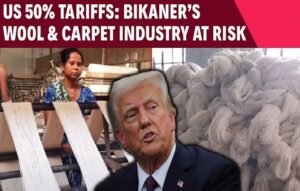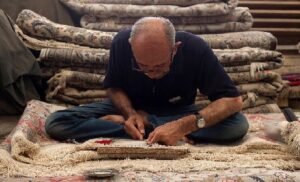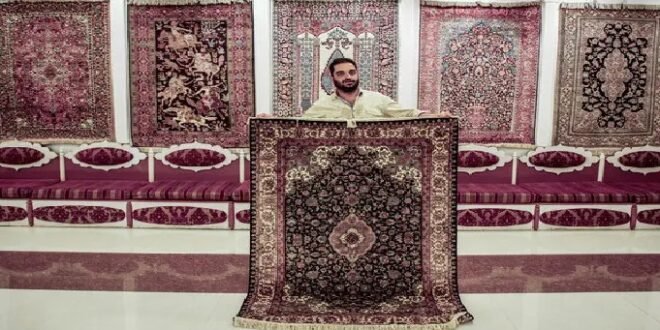13-09-2025
Bureau Report
NEW DELHI/ BHADOHI: Surya Mani Tiwari has had sleepless nights ever since United States President Donald Trump slapped India with 50 percent tariffs.
The 78-year-old exports carpets worth more than 1 billion rupees ($11.4m) from Bhadohi in the northern Indian state of Uttar Pradesh to the US every year but the tariffs, the highest tier so far, have brought business to a screeching halt.
 “We are completely dependent on the US for our business and have no other markets. The tariffs have brought our production to a halt, and no consignment has been dispatched to the US for the past one month,” Tiwari told media. “It is the worst phase of my 50-year career in the carpet business and the industry will die a painful death if the situation doesn’t improve in the next two months.”
“We are completely dependent on the US for our business and have no other markets. The tariffs have brought our production to a halt, and no consignment has been dispatched to the US for the past one month,” Tiwari told media. “It is the worst phase of my 50-year career in the carpet business and the industry will die a painful death if the situation doesn’t improve in the next two months.”
Tiwari is among the several hundred carpet exporters in Bhadohi, popularly known as the carpet city of India, who are staring at a complete collapse of their business ever since Trump announced tariffs on India, initially 25 percent which kicked in on August 7, and an additional 25 percent from August 27 on account of India’s imports of Russian oil which he has said was is fueling the war in Ukraine.
India’s predominantly export-based carpet industry produces handloom, handicraft, knotted, Persian and various other types of carpets that have a high demand in the US, including for wall-to-wall carpeting in homes and businesses.
The industry with a turnover of 160 billion rupees ($1.83bn) employs more than 2.5 million people across the country, the majority of whom are weavers, as per the Carpet Export Promotion Council (CEPC).
Bhadohi is the epicentre of the carpet business and controls more than an 80 percent share of the total turnover. It houses about 1,200 exporters who also double up as manufacturers. Approximately 1.4 million people, 5-6 percent of whom are women, depend on this business for their livelihood.
 “We have been ruined with such high tariffs as the carpet industry runs completely on exports with a very negligible domestic presence,” CEPC director Piyush Baranwal told media. “The US is the major market for our business and contributes to around 60 percent share of the total turnover. Several millions of people earn their livelihood through carpets, which is like a cottage industry here.”
“We have been ruined with such high tariffs as the carpet industry runs completely on exports with a very negligible domestic presence,” CEPC director Piyush Baranwal told media. “The US is the major market for our business and contributes to around 60 percent share of the total turnover. Several millions of people earn their livelihood through carpets, which is like a cottage industry here.”
Production was already on the decline since Trump announced reciprocal tariffs on April 2 but manufacturers and exporters were still hopeful that the bilateral discussions between New Delhi and Washington, DC would bring a competitive tax rate.
“We were hopeful that the discussions will help to sort out the issue, but nothing fruitful came out, which was very disappointing. The harsh tariffs have virtually put the industry on a ventilator as it is not possible to pay such high taxes when the margin is not more than eight to 10 percent for wholesalers,” Baranwal said.
Slipping market share
Sanjay Gupta, a carpet exporter and partner in Global Overseas, pointed out that the industry, despite its modest turnover, generates employment on a large scale. It works like a cottage industry where the exporters outsource orders to weavers who work from their homes.
“The weavers are a major force here,” he said. “The sudden tariffs will have major repercussions, as it might trigger large-scale migration of unemployed people to other states and would be difficult to bring them back in the future. I have lost around 40 percent of my business,” since the reciprocal tariffs were announced in April, he said, and in turn he has cut back on commissions to weavers.
 Pressmediaofindia
Pressmediaofindia




